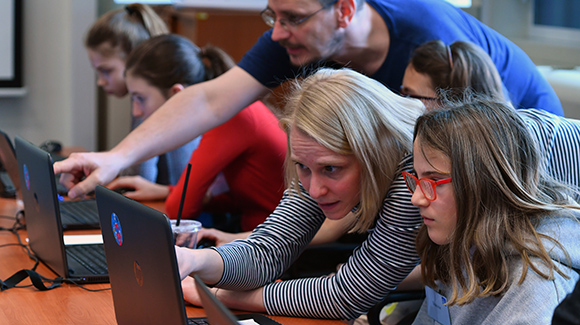
(Photo: IAEA Imagebank/Flickr)
Editor's Note: The California Economic Summit is working on policy proposals that can help lift the 18 million Californians who live in or near poverty. It's an urgent and important issue that has been at the center of a conversation we've been having with Californians on the issue. Jonathan Hasak is the director of public policy and government affairs for Year Up in San Francisco and is adding his voice to that conversation.
The mission of his administration, California Governor Gavin Newsom announced in his inaugural address last January, is achieving a “California for all.” Critical to that success is advancing a cradle-to-career vision to better prepare all Californians with the skills they need to succeed in a changing economy.
Three months into his administration, it’s clear the Governor is more than prepared to deliver on his promise to connect higher education and skills training to the next generation of middle-class jobs. He has appointed senior staff with long trajectories of working to address inequality of opportunity, proposed investments to address access to higher education in his budget, and announced a new Commission on California’s Workforce and the Future of Work at his State of State address.
Shaping the future of work in in California – a state where the gap between the top and bottom 10 percent of families has doubled since 1980, and where more than 700,000 young adults remain disconnected from stable career pathways – is not a new challenge. Efforts to avoid accelerating inequality, create more jobs, and spread economic opportunity have been advanced by Governor Newsom’s predecessors through the promise of tax breaks to businesses; subsidizing of job opportunities; infrastructure, tax, and housing incentives; and the leveraging of resources the private economy has to offer.
But these reforms, well-intentioned as they may be, have not corrected the mismatches in California’s labor market, led to a more efficient talent marketplace, or provided long-term solutions to the economic deprivation too many Californians still face. To comprehensively change the economic drivers that prop up the state’s education and training systems, economic dignity should be the basis for the Newsom administration’s cradle-to-career policy prioritization.
Economic dignity, as economist Gene Sperling recently wrote in an essay, is a core value that can shape job creation programs so that they create jobs that offer workers the dignity of a sense of meaningful skilled work. Perhaps more importantly, it is a value to guide and judge economic success. From this perspective, it’s not hard to imagine what an innovative statewide jobs retraining initiative in California anchored in economic dignity might look like that tackles the perceptions, practices, and policies that perpetuate inequality of opportunity.
In order to disabuse perceptions of talent that have cut off Californians without a bachelor’s degree from economic opportunity, the Governor’s Office of Strategic Communication and Public Engagement could launch a hiring campaign focused on mobilizing statewide employers to make changes to legacy hiring practices, such as removing four-year degree requirements as a proxy for hire. Given that over two-thirds of the job openings in this country created by 2020 will not require a bachelor’s degree, this campaign would expand the economy for Californians without a bachelor’s degree and also increase the likelihood of reaching the ambitious 500,000 apprenticeship goal Governor Newsom ran on during his gubernatorial campaign.
Governor Newsom could also use a combination of private sector funding and a portion of its workforce and training money to create a Dignity of Work Fund. Modeled after the California Career Pathways Trust, a one-time $250 million grant designed to expand career pathway programs in grades nine through community college, Dignity of Work grants would provide funding to regions and localities in California to offer training to displaced and low-wage Californians at community colleges that prepare them for local in-demand middle-skills jobs. Employers would help design curriculum and collaborate with community colleges and proven and effective training providers like Year Up, a national job training organization with five sites in California and which works to catapult opportunity youth from minimum wage jobs to meaningful careers.
A Dignity of Work Fund could also influence training programs across the state to become more effective at preparing Californians for jobs by demonstrating the need for public funding to be driven towards market-based practices and programs aligned to employer demand. Just as President Obama’s Race to the Top program incentivized states to change their education policies when applying for funds, these competitive grants would incentivize regional workforce development boards to become more accountable for producing market-based outcomes so that employment outcomes – not compliance provisions – become the metric used to negotiate training provider contracts and award any public funding in the future.
Governor Newsom’s cradle-to-career vision is ambitious and the steps he has taken in his first months in office to prepare the state for the future of work deserve a lot of credit. Ensuring his cradle-to-career policies are rooted in the value of economic dignity would empower more Californians to lead dignified lives as they navigate the uncertainties of the labor market. It would also make it more likely his administration can achieve its mission of creating a California for all.
Jonathan Hasak is director of public policy and government affairs for Year Up.

